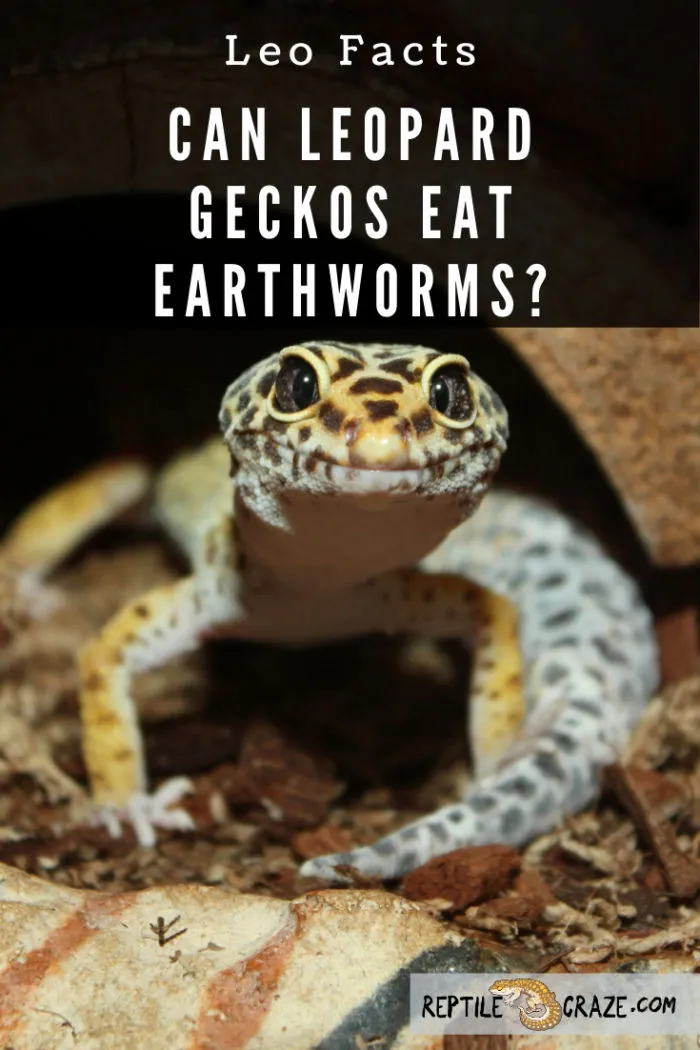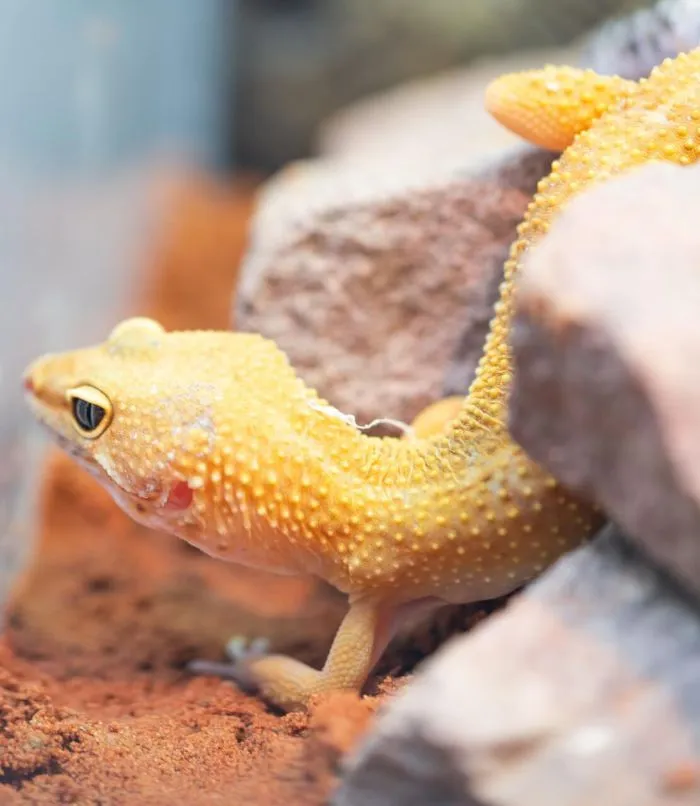 Feeding insects to your leopard gecko is necessary, so they get nutrients and energy to grow, shed, explore, and do all the other normal activities part of a gecko’s day. Are earthworms a good option?
Feeding insects to your leopard gecko is necessary, so they get nutrients and energy to grow, shed, explore, and do all the other normal activities part of a gecko’s day. Are earthworms a good option?
Can leopard geckos eat earthworms? The answer is no. The gecko will not get hurt by eating the earthworms, but they will eventually turn their noses to them. Leopard geckos do not like the substance that earthworms secrete when under stress and will refuse to eat it.
Now you know that earthworms are not the best option for leopard geckos. To get ideas on insects, your gecko can eat, keep on reading.
Table of Contents
Why Not Give Earthworms to Leos?
Earthworms secrete a fluid from their clitellum, which is the “collar” that you sometimes see on an earthworm as it crawls along the ground. It secretes a substance that is slimy and protects its eggs.
Earthworms also secrete mucus that acts as a moisturizer for the skin. And it aids in movement as well as respiration.
Earthworms are not dense in nutrients. They are made of 83% moisture, which is not great for geckos. Instead, you should opt for crickets, roaches, or mealworms.
The nutritional content of an earthworm is as follows:
- Moisture: 83%
- Fat 1.6%
- Magnesium 136 mg per kilo
- Calcium: 444 mg per kilo
- Phosphorus 1590 mg per kilo
If you do choose to feed your leo an earthworm, do not pick ones that you found in your backyard or the forest. Worms that you find in nature may have had contact with chemicals or heavy metals and could be harmful to your reptile.
You should also be aware that earthworms in nature eat a huge amount of organic material. They eat everything, and some of this stuff may have been ridden with parasites, bacteria, mold, and more.
What are Good Insects for Leos?
Insects are a huge part of a leo’s diet-it’s what they mostly eat when in the wild. The two main insects that geckos love to eat are mealworms and crickets.
Crickets are an excellent choice for leopard geckos. You can find these at nearly any major pet store, as reptiles favor crickets.
You have to gut load the insects before you feed them to your gecko. It is a process that lets you give the maximum number of nutrients to your reptile as they eat. You can do this by giving the crickets cricket
Geckos love to catch their
If you find the crickets are hiding from your leo, put a piece of apple or potato in the habitat. The crickets will be drawn out and, therefore easier for your leo to grab. Make sure that you remove any uneaten insects and
Also, we have compiled the best worms for leopard geckos here.

Other Insects
Mealworms/Waxworms are great
Waxworms are slightly fatty when it comes to nutrition, so they should be used sparingly. They serve as more of a treat and can be given to females after they’ve laid eggs.
Dubia roaches are another insect you can give your leo. Dubias have protein, fats, carbs, minerals, and of course, some water. They are odor-free and easy to breed. Leos love them because they are easy to chew and digest quite easily.
Opt for dubias that are 3mm or ⅛ of an inch to 3.8 cm or 1.5 inches. These are perfect sizes for geckos of juvenile and adult sizes.
As with other insects, you should gut load these before you feed them to your leos. It is a good idea to gut load about 24 to 48 hours ahead of offering them as
You will find that the males have wings, but they do not fly all that often. Female dubias do not have wings. These are slow insects, and they do not usually climb vertically. And while crickets are known for being somewhat noisy, these are quiet.
Also read:
Water and Water Bowls
A critical part of feeding your leo involves the water he drinks. You should keep bowls on the shallow side because if an insect gets inside too deep of a bowl it could kill them (therefore wasting the insect) and also damage the integrity of the water.
You should always take a close look at the water bowl each day to make sure the water is clean and safe to drink. Some leos even get into their water to cool off. If this happens, change out the water and make sure the cold spot of your habitat is adequate. It keeps bacteria at bay.
We explain exactly how much water (and in what form) Leopard geckos need in this article. We highly recommend reading it to make sure that your gecko is not dehydrated but also that it is not too moist in your
The Importance of a Varied Diet
Any reptile needs a balanced diet, and this means changing up the insects you feed your leo. After all, you do not eat the same foods every day. And your leo appreciates a change of pace every now and again.
Earthworms should be offered rarely, and besides, there are much better options out there. You should stick with freeze-dried insects or ones that come from your local pet store.
A proper diet for your leo might look like the following: crickets, roaches, mealworms, supplements, and of course, water.
Plus, you will always want to make sure that you dust the insects with a calcium D3 supplement like this because insects bought at a pet store may not contain adequate amounts of this nutrient.
All it takes is coating the insects just 1-2 times per week for adult leos and daily for baby geckos, juveniles, and females that are laying eggs.
You may also place a small dish of calcium powder into the habitat for your gecko to be sure he gets enough.
Vitamins are another necessary part of your leo’s well-being. You should use them sparingly, and do not give them on the same day you give calcium. Just coat feeder insects once per week with vitamins and offer them to your gecko.
Make sure the vitamin supplement you opt for has a calcium to phosphorus ratio of 2:1. It will make sure your gecko absorbs the calcium. We use Rep-Cal as our go-to for administering vitamins.
The process of doing this is simple. Just put the insects into a zip-lock bag or a cup with the calcium/vitamin powder. Shake it up gently until the insects are coated. Then give them to your gecko.
Conclusion
Earthworms are not the best thing for your leo to be eating. Granted, it will not hurt them, but these should be given on a rare basis in favor of some other insects like roaches, worms, and crickets. You will find that your gecko is happy and healthy when you feed these insects.
- Enchi Ball Python: A Unique and Stunning Morph of Python regius - March 27, 2025
- Emerald Tree Monitor: The Enigmatic Green Guardian of the Rainforest - March 26, 2025
- The Egyptian Cobra (Naja haje): A Fascinating Serpent - March 25, 2025
